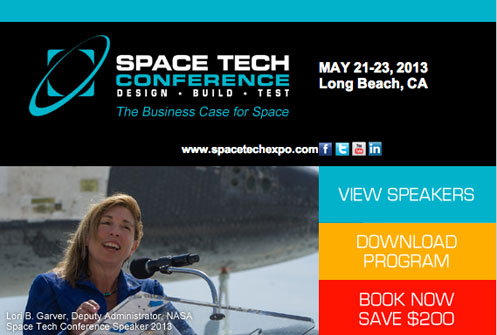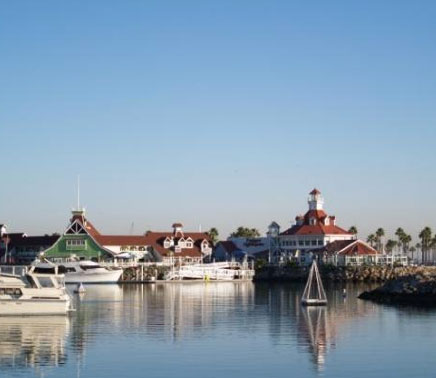
The theme for the 2013 Space Tech Conference is ‘The Business Case for Space’. The program is designed to enable the entire space supply chain and ecosystem to determine the relevant business case for them—helping them to identify products and services that will generate revenue and growth for their businesses.
The 2013 Space Tech Conference will convene in Long Beach right in the heart of cutting-edge engineering, groundbreaking science, and high-technology communities.
A dedicated show in southern California brings everyone to this hub of space exploration, with its concentration of private space companies and proximity to NASA-affiliated and U.S. Air Force facilities. The Space Tech Expo showcases the latest space-related technologies within walking distance of all hotels and amenities.
This thought is echoed with the following attendee’s remark, “With prime contractors like SpaceX or Boeing, Raytheon, Northrop Grumman, a local show in southern California allows engineers to get out of the office and interact, ” said Mike MacBrair, Program Manager for Environmental Connectors Space & Launch, Glenair.
Some of the topics of the various sessions include:
Commercial Crew & Cargo
With NASA focused on deep space missions, private U.S. companies are likely to operate most, if not all, flights between Earth and the International Space Station, saving NASA money and bringing millions of dollars to American enterprises. Key industry players such as Boeing and NASA will examine the latest developments in commercial crew and cargo, discussing the implications for America’s space economy.
Space Tourism: New Horizons and Industry Growth
As carriers and spaceports gear up to take some of the first private paying astronauts to low-Earth orbit and beyond, are we on the cusp of mass space tourism? What are the potential growth projections for this segment of the industry? Also, what does it mean for private enterprises and educational institutions looking to undertake research and development, scientific experiments and small satellite launches? How will this affect local as well as the wider economy and push the space industry to become a trillion dollar industry?

NASA's Space Launch System: The Business Case for Space
NASA’s Space Launch System (SLS) complements the Agency’s commercial crew and cargo initiatives, which are creating a supply line to and from the International Space Station and low-Earth orbit. The evolvable SLS heavy-lift rocket is designed for missions beyond Earth orbit and will be a platform for continuing America’s tradition of human space flight, as well as providing the capability to launch missions of national and international importance.
The SLS acquisition strategy includes using valuable assets already in inventory (RS-25 core stage engines) and hardware well into development (five-segment solid rocket booster and J-2X upper stage engine) to keep the program’s budget “flat” in a resource-constrained environment. Working with the US aerospace industry, the SLS will be safe, affordable, and sustainable across the years it is expected to be in operation, beginning in 2017.
As NASA continues its role of advancing the frontier, the SLS will provide a unique national capability to enable future exploration goals, offering reduced mission time, increased mass margins, reduced spacecraft complexity, and increased payload volume. The benefits of exploration are many: scientific knowledge, technological advancements, economic expansion, public excitement, and national security.
Innovation Update: Mars One—Humans on Mars in 2023?
Mars One is a not-for-profit organization that will take humanity to Mars in 2023, to establish the foundation of a permanent settlement from which we will prosper, learn and grow. Before the first crew lands, Mars One will have established a habitable, sustainable settlement designed to receive astronauts every two years. To accomplish this, Mars One has developed a precise, realistic plan based entirely on existing technologies. Mars One founder, Bas Lansdorp will share the latest updates from this exciting venture to create the first space settlement.
More information is available here.

